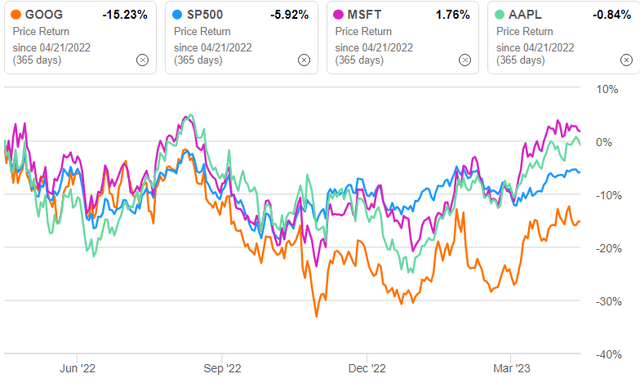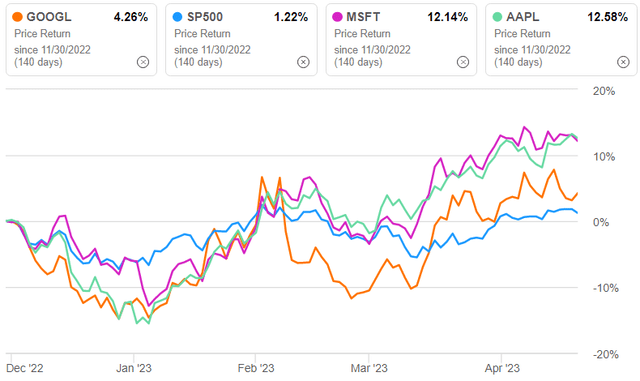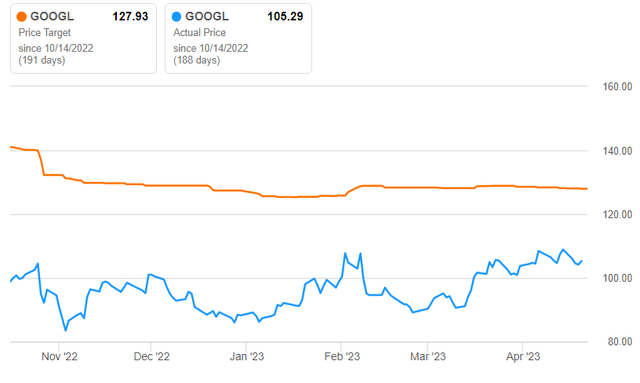Summary:
- Back in February, I predicted that Google might lose its position as default search engine on iOS.
- Now Samsung has made the first move and is apparently thinking about making Bing the default search engine on its devices.
- While I believe ChatGPT is only one of the issues weighing on Alphabet, it absolutely adds a lot of uncertainty.
- The range of potential outcomes for Alphabet has widened enormously in recent months, but most are now well-known risks and presumably more than priced in.

Monopoly – this is what investors are really worried about
martince2
Google Stock Key Metrics
Trading for $106 per share, Google parent Alphabet (NASDAQ:GOOG) (NASDAQ:GOOGL) is down ~30% from its all-time high in 2021. It trades for 21x consensus EPS (2023e) and has a market cap of $1.35T. From its 52w-low of $83.45 it has gained 27%, but has underperformed both the broader market and its large tech peers over the past twelve months:

GOOG one-year returns compared to its peers (Seeking Alpha)
What Should Investors Consider?
Looking at this chart, we can notice that Alphabet started to underperform materially after its Q3/22 earnings release on 10/25/22 and not after the launch of ChatGPT (which entered the scene only one month later).
This shows that the market had become doubtful of Google’s continuing success regardless of the much-discussed potential threat to its search business. On the Q3/22 call, ChatGPT was not even mentioned. Instead, the key issue apparently was the impact of a potential recession on global advertising markets and the ballooning headcount (+51.000 in seven quarters) with uncertain ROI.
Actually, when looking at the period from the launch of ChatGPT until today, we can see that Alphabet outperformed the index by 3%, while underperforming Microsoft (MSFT) and Apple (AAPL) by about 8% each:

GOOG compared to its peers since ChatGPT launch (Seeking Alpha)
The situation looks interesting: What would have happened without the ChatGPT launch? Would Alphabet have enjoyed a recovery more similar to its peers?
In other words: Is there too much market pessimism only apparently related to ChatGPT, while the real issue are ad markets and capital allocation?
Looking at sell-side price targets and their evolution shows a strong negative impact from Q3/22 earnings and a shallow downtrend over the subsequent months:

GOOGL price compared to sell-side price targets (Seeking Alpha)
We don’t see any special impact from ChatGPT, it simply looks like yet another issue weighing on an already battered stock.
ChatGPT is just one of Alphabet’s problems
In my recent article “Google Braces For A Frightening Lollapalooza Effect” I have outlined some of the issues impacting Alphabet and was among the first analysts to highlight how ChatGPT might lead to Google losing its sweet spot as the default search engine on iOS.
That said, I believe investors generally underestimate the extent of the upcoming AI-revolution, i.e. how far-reaching its impacts will be on almost everything we do, while overestimating its impacts on specific businesses.
They underestimate its extent because it is impossible to predict with any sort of precision. This is a new world. On the other hand they overestimate impacts on specific businesses as they see them far too static. But businesses adapt – especially Alphabet.
In a recent “60 Minutes” interview, Alphabet CEO Sundar Pichai seemed to agree with me.
With the AI revolution still in its infancy, playing around with ChatGPT and its manifold pitfalls is like a toddler crawling around, trying to walk. When it looks like it is flying, it is actually falling. But when it looks like it is falling, it is actually learning to run and jump.
It will understand that it has no chance to learn flying, but pretty soon it will be very good at walking and running.
Back to AI, there will be many specific, safe and productive applications, while the current experimental stage will remain what it is: a playing field useful only for trying out what can and what cannot be done (yet).
On this backdrop, Alphabet will certainly remain competitive and the ChatGPT debate looks like a false problem. Alphabet’s popular Workspace productivity suite of applications will be enhanced by AI features just like Microsoft Office. Its Bard chatbot will absolutely be competitive. Google will remain a dominant search engine. As CFO Ruth Porat pointed out during a recent investor conference, Alphabet is already using AI in many products, sometimes without users even noticing.
However, what probably will change and is extremely hard to predict with precision is the way users will interact with their devices, how they will search, where their searches will originate, which paths they will follow, where ads should be placed, and where businesses need to position the ideal “tollbooth” to monetize their services.
What really is in jeopardy here is Google’s market position as a monopoly with all the related financial benefits.
Why May Samsung Switch To Bing?
A few days ago, confirming my hypothesis exposed back in February, the NYT reported that “Google’s employees were shocked when they learned in March that the South Korean consumer electronics giant Samsung was considering replacing Google with Microsoft’s Bing as the default search engine on its devices.” Apparently the reaction was total panic.
If true, this might indicate complacency, which would be a huge problem in itself.
On the other hand, Samsung might simply try its hand in negotiating better terms for its upcoming contract renewals with Alphabet.
Or, maybe – and this is admittedly a highly speculative thought – it might actually try to hurt its key competitor Apple by aiming at Google. – How would that work? – Well, in my understanding Apple needs Alphabet as a strong competitor to assuage concerns about its market power, the monopoly status of its App store etc. A weaker Alphabet would mean that Apple would appear even stronger and probably too strong, and regulators might finally intervene. (In this aspect I disagree with Bank of America (BAC) analyst Wamsi Mohan, who believes Alphabet winning in its antitrust case because of reduced market power would also remove an overhang for Apple. The outcome should in my opinion be exactly the opposite.)
Certainly, Samsung doesn’t have much to lose from weakening its key competitors, while trying to get a better deal from Microsoft, which could be inclined to pay up for search traffic on Samsung phones in order to gain share, get things moving for Bing and weaken Google’s moat, while potentially also indirectly causing a regulatory intervention on Apple.
Any Machiavellian considerations aside, ChatGPT is obviously the most important novelty of the moment and Samsung might simply want to offer its users a popular new thing. Given the implications of the AI revolution highlighted above, Samsung might also want to get some first-hand data and experience with ChatGPT in order to better understand its potential future applications.
There certainly is no lack of good reasons for Samsung to experiment with Bing’s new functionality. And this clearly is a problem for Google.
How May Google And Alphabet Be Impacted By Samsung Switching To Bing?
As I have said in my last article, the high price paid by Alphabet for keeping the spot as the iOS default search engine indicates how fragile Alphabet perceives Google’s moat to be. In fact, once users have an alternative, all the beauty of the monopoly is gone.
If there is a search monopoly, pricing power is huge, as every enterprise absolutely needs to safeguard its spot among search results. Without a monopoly, the available budget per search engine shrinks, as enterprises need to be present on more than one service. If they have to double their efforts, the price per ad will halve.
Samsung’s move cannot have any positive consequences for Alphabet: It will either have to give up some margin in order to keep its preferred status at Samsung or it will lose market share. And if it loses market share, advertising margins will shrink.
In the meantime, at this stage Microsoft can afford (and should afford, in my opinion) to be an irrational competitor, i.e. pay even an absurd amount of money to gain share.
Some investors counter this argument by saying that users would set Google to default anyway, while Samsung would only lose search revenue. This is not what Alphabet itself seems to believe, otherwise it would not give up such a large share of its earnings to purchase the default position. Moreover, it has done so for many years, while Bing was a certainly much less attractive competitor. Alphabet knew that guaranteeing itself a monopoly and, most importantly, keeping all others at single digit market shares was well worth the fee.
In addition, Apple is watching. Just like Samsung, it might try its hand at squeezing a few more dollars out of Alphabet in exchange for keeping Google as the default option. If Apple chose to switch to Bing or leave the choice up to its users, panic would not only descend upon Mountain View, but upon all Alphabet investors as well. Both Tim Cook and Sundar Pichai know this.
All in all, Alphabet’s position has weakened.
What Is The Long-Term Outlook?
That appears to be the key question: Long perceived as the “moatiest” of all large-moat businesses, Google now looks more fragile. There is no doubt it will be able to compete and rake in substantial earnings, but it has become more difficult to predict revenue growth and margins.
In addition, the fact that we are looking at a business that has added tens of thousands of employees in little time only to let them go just months later, a business that has not returned almost any money to its shareholders so far, despite generating hundreds of billions of profits, makes it even more difficult to forecast potential returns. (As I have shown in my last article, instead of “returning capital to shareholders”, Alphabet has actually taken almost all its profits from shareholders.)
Is Alphabet Stock A Buy, Sell, Or Hold?
The fact that the market apparently doesn’t seem to trust the company to deliver better than market-average results is likely the result of an unusually large range of potential outcomes, coupled with very justified concerns regarding capital allocation.
The latter represents the big caveat to any bull thesis out there and needs to be watched closely – maybe even more closely than the dynamics around the AI revolution.
In my opinion, despite all the issues with Alphabet’s competitive position, the company will continue to generate robust profits. Even with drastically shrinking margins I projected in my last article net profits of ~$95B in 2033 or over 50% profit growth from today.
While this may look depressing to those used to 15%+ profit growth per year, it could still represent a decent return, given the current share price. Even in my bear case Alphabet would generate $700-800B of FCF over the next decade. But its shareholders would only profit if capital allocation improved.
An improving capital allocation from a shareholder perspective means less stock options for employees and less perks in general – which is nothing short of a revolution for spoiled and pampered Silicon Valley standards. So it remains to be seen how such a revolution would affect employee availability, morale and productivity – another risk to watch.
Ultimately, I believe the market’s fear of uncertainty has probably gone too far and punished Alphabet too much. Capital allocation must and likely will improve. ChatGPT is a manageable threat. Profits will grow, although probably less rapidly than we were used to.
Risks are highly visible, which is why the sell-side has been steadily reducing its price targets. Usually, when risks have emerged clearly and “uncertainties have become certain”, the market is done selling off a business. Therefore I rate Alphabet as a Buy. But it is a timid Buy.
Analyst’s Disclosure: I/we have no stock, option or similar derivative position in any of the companies mentioned, and no plans to initiate any such positions within the next 72 hours. I wrote this article myself, and it expresses my own opinions. I am not receiving compensation for it (other than from Seeking Alpha). I have no business relationship with any company whose stock is mentioned in this article.
Seeking Alpha’s Disclosure: Past performance is no guarantee of future results. No recommendation or advice is being given as to whether any investment is suitable for a particular investor. Any views or opinions expressed above may not reflect those of Seeking Alpha as a whole. Seeking Alpha is not a licensed securities dealer, broker or US investment adviser or investment bank. Our analysts are third party authors that include both professional investors and individual investors who may not be licensed or certified by any institute or regulatory body.
